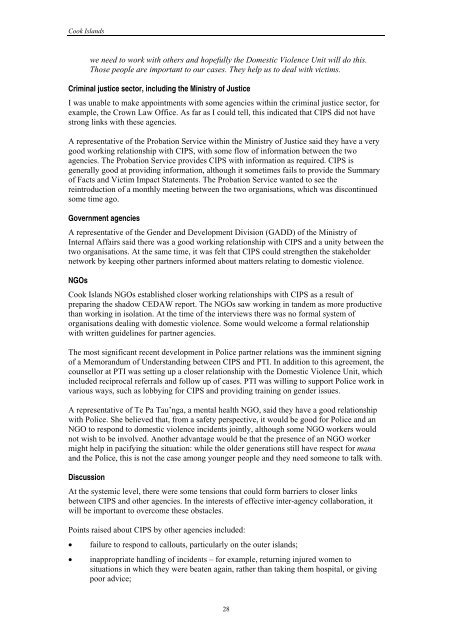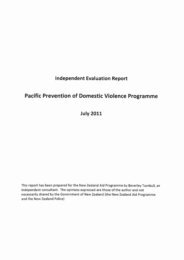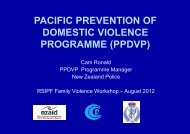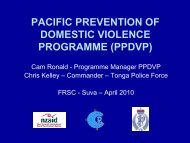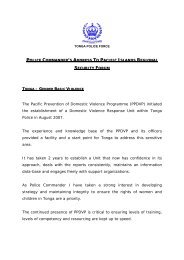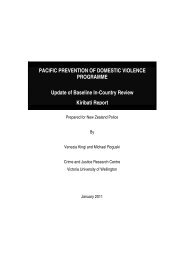Cook Islands - Pacific Prevention of Domestic Violence Programme
Cook Islands - Pacific Prevention of Domestic Violence Programme
Cook Islands - Pacific Prevention of Domestic Violence Programme
You also want an ePaper? Increase the reach of your titles
YUMPU automatically turns print PDFs into web optimized ePapers that Google loves.
<strong>Cook</strong> <strong>Islands</strong><br />
we need to work with others and hopefully the <strong>Domestic</strong> <strong>Violence</strong> Unit will do this.<br />
Those people are important to our cases. They help us to deal with victims.<br />
Criminal justice sector, including the Ministry <strong>of</strong> Justice<br />
I was unable to make appointments with some agencies within the criminal justice sector, for<br />
example, the Crown Law Office. As far as I could tell, this indicated that CIPS did not have<br />
strong links with these agencies.<br />
A representative <strong>of</strong> the Probation Service within the Ministry <strong>of</strong> Justice said they have a very<br />
good working relationship with CIPS, with some flow <strong>of</strong> information between the two<br />
agencies. The Probation Service provides CIPS with information as required. CIPS is<br />
generally good at providing information, although it sometimes fails to provide the Summary<br />
<strong>of</strong> Facts and Victim Impact Statements. The Probation Service wanted to see the<br />
reintroduction <strong>of</strong> a monthly meeting between the two organisations, which was discontinued<br />
some time ago.<br />
Government agencies<br />
A representative <strong>of</strong> the Gender and Development Division (GADD) <strong>of</strong> the Ministry <strong>of</strong><br />
Internal Affairs said there was a good working relationship with CIPS and a unity between the<br />
two organisations. At the same time, it was felt that CIPS could strengthen the stakeholder<br />
network by keeping other partners informed about matters relating to domestic violence.<br />
NGOs<br />
<strong>Cook</strong> <strong>Islands</strong> NGOs established closer working relationships with CIPS as a result <strong>of</strong><br />
preparing the shadow CEDAW report. The NGOs saw working in tandem as more productive<br />
than working in isolation. At the time <strong>of</strong> the interviews there was no formal system <strong>of</strong><br />
organisations dealing with domestic violence. Some would welcome a formal relationship<br />
with written guidelines for partner agencies.<br />
The most significant recent development in Police partner relations was the imminent signing<br />
<strong>of</strong> a Memorandum <strong>of</strong> Understanding between CIPS and PTI. In addition to this agreement, the<br />
counsellor at PTI was setting up a closer relationship with the <strong>Domestic</strong> <strong>Violence</strong> Unit, which<br />
included reciprocal referrals and follow up <strong>of</strong> cases. PTI was willing to support Police work in<br />
various ways, such as lobbying for CIPS and providing training on gender issues.<br />
A representative <strong>of</strong> Te Pa Tau’nga, a mental health NGO, said they have a good relationship<br />
with Police. She believed that, from a safety perspective, it would be good for Police and an<br />
NGO to respond to domestic violence incidents jointly, although some NGO workers would<br />
not wish to be involved. Another advantage would be that the presence <strong>of</strong> an NGO worker<br />
might help in pacifying the situation: while the older generations still have respect for mana<br />
and the Police, this is not the case among younger people and they need someone to talk with.<br />
Discussion<br />
At the systemic level, there were some tensions that could form barriers to closer links<br />
between CIPS and other agencies. In the interests <strong>of</strong> effective inter-agency collaboration, it<br />
will be important to overcome these obstacles.<br />
Points raised about CIPS by other agencies included:<br />
• failure to respond to callouts, particularly on the outer islands;<br />
• inappropriate handling <strong>of</strong> incidents – for example, returning injured women to<br />
situations in which they were beaten again, rather than taking them hospital, or giving<br />
poor advice;<br />
28


